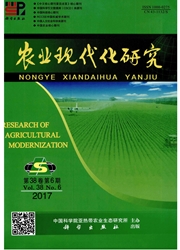

 中文摘要:
中文摘要:
粮食安全是一个系统工程,对于粮食问题的统筹考虑有助于得到更为科学的政策启示。本文从"种在哪"、"谁来种"、"种什么"、"怎么种"、"如何分"等方面述评了粮食安全治理现状及其存在的主要问题。研究表明,中国已经构建了一个包括生产、消费、分配等多个方面的政策支持体系,通过中低产田改造、提高主产区种粮积极性等途径仍可实现进一步的粮食增产与农民增收,但受粮食属于"准公共产品"等因素影响,我国粮食生产仍面临种植区域不稳定、种粮主体积极性不高、种植结构调整滞后、经营方式有待完善、粮食市场配置效率尚需提高等诸多问题。未来的政策调控需要发挥市场在资源配置中的关键性作用,积极引导并促成各类主体按照市场规律与政府调控目标开展相关行为,最终保障并实现国家粮食安全。
 英文摘要:
英文摘要:
Since grain security is a complex system, it is critical to policy making that we have a framed and thoughtful consideration of China's grain problems. Based on literature review, this research examined the current situation and main problems of China' s grain security system by analyzing five key questions related to grain security, including where to grow, who to grow, what to grow, how to grow, and how to distribute of grains in China. Results show that China has already established a complete policy system to support grain production, distribution, and consumption. This research also found that it is possible to improve China's grain yield and farmers' income through land improvement for low and medium yield farmland and providing more incentives for farmers in the main grain producing regions. However, since grains are considered as ' quasi-public goods' there are still many unsolved issues, including unstable planting acreage, lack of enthusiasm in grain production, slow industry structural adjustment, imperfect management method, and inefficient grain allocation, etc. To realize and maintain the grain security in China, government policy should play significant roles in macro-managing resource allocations, directing marketing behaviors for all the involved parties, and monitoring the realization of government goals in grain security system.
 同期刊论文项目
同期刊论文项目
 同项目期刊论文
同项目期刊论文
 期刊信息
期刊信息
